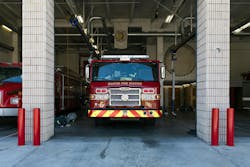St. Petersburg, FL, Fire Rescue is Working to Combat the Firefighter Suicide Crisis
September is National Suicide Prevention Awareness Month, a time to reflect on the behavioral health struggles that affect people across all walks of life—including the first responders who dedicate their careers to protecting our communities. Among these brave individuals, there’s a disturbing and often overlooked truth: more firefighters die by suicide than in the line of duty.
Despite the growing awareness of this crisis, nearly 73 percent of fire departments nationwide still lack a behavioral health program, leaving countless first responders without the critical support they need.
For St. Petersburg Fire Rescue (SPFR) in Florida, that was unacceptable.
So, Chief Richard Ganci was tasked with developing a robust behavioral health program. Six years later, he and his team had built one of the most comprehensive programs in the state, possibly even the country.
Training for survival
A firefighter with SPFR since 1986, Ganci retired in 2014, only to immediately step into a Division Chief role at Pinellas Park Fire Rescue. In 2018, he returned to SPFR as the Division Training Chief with one mission: to train his firefighters to be the best—and that meant not only preparing them physically but emotionally as well. "We’re training for survival,” said Ganci. “It’s my responsibility to make sure that everyone gets home safe.”
The greatest obstacle in growing the program was the stigma surrounding behavioral health, especially within firefighting. For many, seeking help is still viewed as a sign of weakness, a perception that SPFR was determined to change. Early on, the department implemented a peer support program designed specifically for firefighters, from firefighters. "Peer support is crucial because it connects first responders with colleagues who understand their unique challenges," he said.
A Florida State University behavioral health study found that 47 percent of firefighters have contemplated suicide at some point in their careers, while 16 percent have attempted it. Yet, stigma and fear often prevent them from seeking help. SPFR’s peer support program is designed to meet firefighters where they are, offering them the support they need from trusted peers.
Tragedy leads to action
The importance of this program hit home for SPFR when the department experienced three heartbreaking losses. One officer died due to COVID-19, and two firefighters lost their lives to suicide. These deaths serve as motivation for the department. "It’s unacceptable," Ganci said. These tragedies drive the department’s determination to ensure every firefighter has the resources and support to prevent further losses.
In 2018, there were two behavioral health programs available for SPFR personnel. Currently, that number has grown to include nine additional programs offering a variety of support options, including free treatment from privately contracted doctors, visits from comfort dogs, monthly breakfasts with a chaplain, Critical Incident Stress Management (CISM) with sentinel call tracking, and tailored training programs based on data-driven evaluations.
“The programs have to reflect the day-to-day of what our personnel are dealing with,” said Ganci. “It’s the St. Pete way. We train to go above and beyond in everything we do.”
True to his word, Ganci built SPFR’s in-house behavioral health program from the ground up, turning it into a model for departments across the state. His efforts have been so effective that in 2024, just one of the many programs he introduced was utilized more than 780 times.
What sets SPFR’s behavioral health initiative apart is its data-driven approach. In 2021, it was discovered that 65 percent of program utilization stemmed from relationship problems. Realizing they were only addressing part of the problem, Ganci and the team sought to expand coverage to include firefighters' families. "We were doing a great job of treating half the problem," he said. With the support of the city council, SPFR successfully broadened the coverage to support families as well.
More to do
Despite the success, Ganci remains vigilant, reluctant to celebrate. "It never makes me feel comfortable," he says. "We're a brotherhood and a sisterhood—you never want to let your family down."
Ganci's determination to prevent firefighter suicide extends beyond St. Petersburg.
The programs developed at SPFR are now shared with all 18 fire departments in Pinellas County, Sunstar Paramedics, and Pinellas County 9-1-1 Dispatch. Ganci monitors calls across all 20 agencies and tracks SPFR personnel who may have been overexposed to sentinel calls—those involving high-stress situations like the death of a child or suicide. Any firefighter or paramedic who has experienced multiple sentinel calls in a short time is consulted for support. Ganci tracks these alerts personally, ensuring no one falls through the cracks.
SPFR is committed to defying the odds. As Ganci puts it, "We’re a resilient workforce, but we’re human too, and we need to take care of each other."
Ganci's tireless work has positioned SPFR as a national leader in firefighter behavioral health, but for him, the mission isn’t over until every firefighter has access to the support they need. "You want them to retire healthily, both mentally and physically," he says. "That’s the goal."
About the Author

Ashlie Handy
Ashlie Handy is a former fire department spokesperson/public information officer. She holds a master’s degree in public relations from the University of Florida and brings nine years of experience in nonprofit and government industry media relations.
